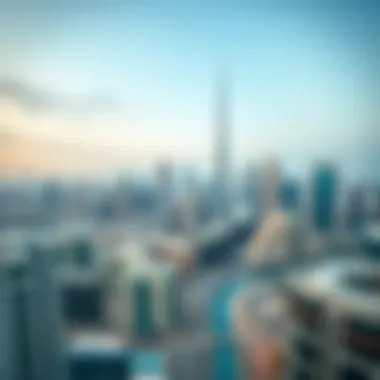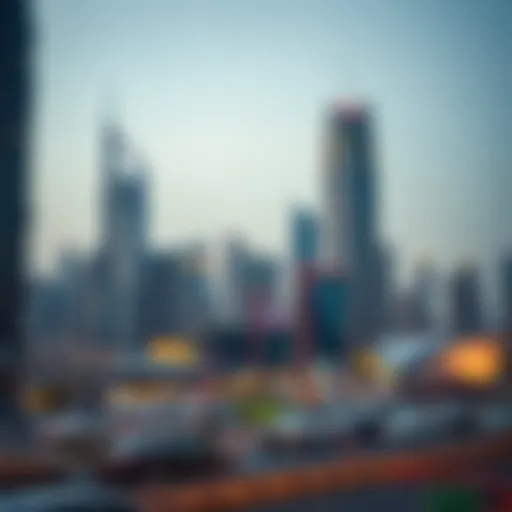Exploring Dubai's Real Estate Market Opportunities


Intro
Dubai’s transformation from a humble fishing village to a global powerhouse is nothing short of remarkable. This city has a unique blend of tradition and modernity, making it a pulsating center for culture, commerce, and, notably, real estate. With its stunning skyline, diverse population, and expansive commercial opportunities, Dubai attracts not just tourists and expatriates, but also serious investors looking to capitalize on a lucrative market. This article aims to peel back the layers of the real estate landscape in Dubai, presenting a thorough analysis of its current trends, investment prospects, and future forecasts, ensuring that both seasoned investors and first-timers can navigate its complexities with confidence.
Market Insights
Current Trends in Dubai Real Estate
The real estate market in Dubai has always been a dynamic one, shifting rapidly in response to global economic conditions. Currently, several key trends are shaping the landscape. One notable trend is the increasing demand for sustainable properties. Buyers are leaning towards eco-friendly developments and projects that prioritize energy efficiency, as these align with a growing global consciousness regarding environmental preservation.
Additionally, luxury properties are witnessing a surge in popularity, particularly among high-net-worth individuals. With developments like Burj Crown and The Address Sky View, which offer stunning views and five-star amenities, the allure of opulence is drawing attention. Expat communities are also a significant driving force; the influx of skilled professionals from various sectors has fostered a steady demand for both rental and owned properties, especially in areas like Dubai Marina and Downtown Dubai.
Forecasting Future Market Changes
Looking ahead, experts suggest that Dubai's real estate market will continue its upward trajectory. The Expo 2020, although delayed, has resulted in increased infrastructure development and enhanced international recognition. This event sparked investments in transport and hospitality sectors, making the city even more appealing to future residents and investors alike.
A potential spike in interest from overseas buyers is also on the horizon. The UAE’s favorable residency rules and property laws, designed to attract foreign investment, can be a game changer. This ongoing legislative shift signals a bright future for real estate in Dubai. However, potential investors should remain cautious of market fluctuations and consider doing comprehensive research before plunging into investment.
"Dubai is not just a city; it��’s a vision of the future, making it a hotbed for real estate opportunities."
Investment Strategies
Tips for First-Time Investors
- Know Your Budget: Understand all costs involved, including maintenance fees, taxes, and potential renovations.
- Research Locations: Areas can vastly differ in terms of potential returns. Focus on up-and-coming neighborhoods that are seeing infrastructural investments.
- Consider Rental Yields: High rental yields can lead to quicker returns on investment. Popular areas for rentals include Dubai Marina and Jumeirah Lake Towers.
- Seek Professional Help: Consulting local real estate agents can provide insights that are not always visible in reports and can help you navigate the legalities involved.
Understanding ROI in Dubai Properties
Return on Investment (ROI) in Dubai can vary significantly based on different factors, such as property type and location.
- Residential properties: typically offer a rental yield of around 5% to 7%, making them relatively sound investments for those seeking passive income.
- Commercial properties: on the other hand, may yield higher returns, sometimes exceeding 8%, particularly in bustling districts like DIFC.
Potential investors should analyze market data and forecasts, paying attention to trends that can influence property values. Websites like Dubai Land Department and Bayut provide functional data for better decision-making.
In summary, while Dubai’s real estate market holds ample promise, investing requires a strategic approach. From understanding current trends and anticipating future shifts, to deploying effective investment strategies, conducting thorough research and planning is crucial to maximizing potential returns.
Foreword to Dubai as an International City
Dubai stands as a striking example of urban metamorphosis, transforming from a modest fishing village into a global nexus of trade, tourism, and culture. This extraordinary change underlines the significance of Dubai in today’s interconnected world. Understanding why Dubai is classified as an international city offers insights not only into its real estate landscape but also into economic, social, and cultural dynamics that draw a myriad of expatriates and investors alike.
The very essence of an international city is tied to its ability to attract a diverse range of people and businesses from around the globe. In the case of Dubai, factors such as strategic geographical location, world-class infrastructure, and a progressive regulatory framework play pivotal roles. Other essential elements include a melting pot of cultures, an unparalleled lifestyle, and vibrant economic opportunities. This article will venture into these aspects and detail the challenges and opportunities presented by Dubai's real estate market.
Moreover, the international status of Dubai facilitates a flux of talent and innovation, which further enhances its appeal. The interplay of these factors cultivates a fertile ground for businesses and investors. Examining Dubai as an international city is not just about the present but also encompasses its historical context and future prospects that continue to evolve.
As we journey through this article, we will explore specific nuances of Dubai's thriving real estate sector and what it signifies in the broader context of its international character and appeal.
Understanding the Concept of an International City
To grasp what makes a city 'international,' one must explore various parameters, such as cultural exchange, economic interdependence, and social integration. An international city facilitates an environment where the exchange of ideas flourishes across borders. In Dubai, policies have been crafted to support this notion, fostering connections among local and international communities.
Dubai's Ascendancy on the Global Stage
In recent decades, Dubai has risen on the global stage like a phoenix. Fuelled by ambitious infrastructure projects, the city now boasts some of the tallest skyscrapers and luxurious lifestyles that are practically unmatched elsewhere. This ascendance is grounded in significant investments, government initiatives to diversify the economy, and active participation in global markets.
Notably, events such as the Dubai Expo 2020 have showcased the emirate’s potential to attract international businesses and talents, reiterating its status as a prime destination. In focusing on these facets—along with the role of tourism and high-profile global events—this section elucidates how Dubai continues to solidify its position as a pivotal international city.
Historical Context of Dubai's Development
Understanding the historical growth and context of Dubai is crucial for grasping its modern real estate landscape. The city has undergone dramatic changes, transforming from a humble fishing village to a beacon of international commerce and tourism. This transformation did not happen overnight; rather, it evolved through pivotal moments in its history that laid the foundation for the current real estate boom. By examining these historical contexts, investors and expatriates can appreciate how past decisions shape today’s bustling property market.
Early Growth and Transformation
Dubai's early days were intertwined with its geographical advantages. The city’s location along trade routes made it a natural hub for merchants. In the early 20th century, the discovery of oil in the 1960s marked a turning point. This wealth catalyzed extensive infrastructure projects, such as roads, ports, and the establishment of free zones that lured international businesses.
In recent years, projects like the Burj Khalifa, which opened in 2010, are symbols of this transformation, attracting millions of tourists and potential investors alike. The city's drive to diversify its economy from relying solely on oil also saw the development of industrial zones and the establishment of numerous foreign banks, further bolstering the real estate market.
This drive for transformation set the stage for a diverse property market, inviting both domestic and foreign investments.
Key Economic Milestones
Several key economic milestones contributed significantly to Dubai's positioning as a global city.


- Establishment of Dubai Investment Authority (2002): This agency played a pivotal role in managing large-scale investments and ensuring financial growth. The initiatives launched by this authority fostered a more structured approach to real estate development.
- Launch of the Dubai Freehold Property Law (2002): This legislation allowed foreigners to buy property in designated areas, creating an immediate influx of investment and increased interest from expatriates looking to settle in Dubai.
- The Global Financial Crisis (2008): Although a setback, the crisis eventually led to corrections in property prices, making real estate more affordable. This created opportunities for investors who had been sitting on the sidelines, waiting for a chance to enter the market at better prices.
- Expo 2020: Although postponed to 2021 due to the pandemic, this global event is anticipated to usher in substantial investment and development initiatives, stimulating real estate demand as the world turns its sights back on Dubai.
Overall, these milestones have been the backbone of Dubai’s remarkable growth narrative and provide valuable insights for prospective buyers and investors as they navigate this vibrant market today.
Demographics and Expatriate Population
Dubai’s standing as a global city cannot be fully appreciated without considering the demographic makeup and the significant presence of expatriates. Understanding the demographics of Dubai is critical when assessing its real estate landscape, as the needs and preferences of a diverse population shape the market dynamics in distinct ways. The expatriate community plays a pivotal role in this city, not only contributing to its economy but also influencing its cultural fabric.
Composition of the Expat Community
The social canvas of Dubai is a tapestry woven from various nationalities and cultures. With a substantial expatriate population exceeding 80%, the city has transformed into a melting pot of languages, traditions, and lifestyles. This remarkable figure underlines the appeal of Dubai to individuals from different walks of life, creating a unique environment ripe for social interactions and multicultural experiences.
- Nationalities: The expats in Dubai represent a broad spectrum. Indians, Pakistanis, and Bangladeshis form a significant portion, followed closely by nationalities from Western countries like the UK, USA, and Europe. Each group brings its own cultural nuances which enrich the overall fabric of the community.
- Age and Professional Demographics: Many of the expatriates are professionals in sectors such as finance, real estate, technology, and hospitality. The presence of skilled labor fuels the economy and creates demand for housing that caters to varying income levels and lifestyle preferences.
- Family Structures: Families moving to Dubai often seek larger homes, closer schools, and family-friendly amenities. This trend informs real estate developments focusing on suburban expansions and gated communities, appealing to dual-income households as well as single professionals.
As such, understanding this demographic composition is crucial for real estate investors and developers aiming to meet the demands of this varied market.
Cultural Impacts of a Diverse Society
The diverse society in Dubai lends itself to a myriad of cultural impacts that shape both daily life and the broader economic landscape. With so many nationalities coexisting, cultural exchange happens more frequently. The influence of this multiculturalism is particularly visible in several areas:
- Culinary Offerings: The food scene in Dubai is a testament to its diversity. From traditional Emirati cuisine to Indian curries and Italian pastas, various eateries cater to the tastes of its eclectic residents, fostering community ties.
- Festivals and Celebrations: Throughout the year, the city's calendar is peppered with festivals from different cultures. Events such as Diwali, Chinese New Year, and Christmas are celebrated widely, creating opportunities for social bonding among cultures and reinforcing the spirit of tolerance.
- Work Environment: Companies here often reflect the city’s diversity, with workplaces becoming more inclusive and collaborative. This cultural blend enhances creativity and innovation, giving businesses a competitive edge in the international market.
Overall, as the expatriate demographic continues to evolve, so too will Dubai’s cultural and economic landscape. Investors and stakeholders must take note of these dynamics while strategizing in the real estate realm.
"Cultural integration in Dubai is not just beneficial; it is essential for fostering innovation and building a cohesive society."
In summary, the impact of demographics and the rich expatriate tapestry has significant implications on the real estate market, influencing everything from housing demand to urban planning. Those involved in the sector must remain attuned to these shifts to capitalise on opportunities that align with the lifestyle aspirations of a diverse and growing population.
For more in-depth analysis, refer to resources such as Wikipedia and Britannica.
Please remember to keep an eye on changing demographics and public sentiment—this is crucial for maintaining a competitive edge in Dubai’s ever-evolving real estate market.
Economic Indicators and Real Estate Growth
Understanding the interplay between economic indicators and the growth of real estate in Dubai is crucial for investors, analysts, and anyone interested in the market dynamics of this vibrant city. Economic indicators serve as the backbone of city planning and investment strategies by revealing trends, forecasts, and the overall health of the economy. In Dubai’s case, the way these indicators shape the real estate landscape is paramount as it reflects the aspirations, demands, and even the risks tied to investments.
The UAE’s economy has shown remarkable resilience and adaptability. It has transitioned from an oil-reliant economy to one that thrives on diversification and innovation. Real estate, alongside sectors like tourism, finance, and logistics, plays a pivotal role in this growth. Combined, these elements create a synergetic environment that fosters continued development and a steady influx of expatriates, thereby stimulating the housing market. Investors should pay close attention to the correlation between GDP growth rate and real estate investments because a growing economy often leads to higher demand for residential, commercial, and retail spaces.
GDP and Economic Diversification
To understand the significance of economic diversification, consider this: if Dubai's economy was a dining table, oil would be just one dish, and now there are many more options to choose from. The city has made extraordinary efforts to broaden its economic base, ensuring that various sectors contribute to GDP. This diversification matters profoundly when it comes to real estate. A thriving tourism sector, for example, creates demands for hotels, luxury villas, and other accommodation facilities.
- In recent years, sectors such as technology, renewable energy, and healthcare have started to rise, reflecting an ongoing commitment to innovation.
- As tourism figures climb towards record highs, the commercial real estate sector breathes life into new developments that cater to international visitors.
An example worth noting is the Expo 2020, which spurred investment in infrastructure and increased foot traffic. Events like these showcase Dubai’s ability to host global gatherings, thus impacting real estate opportunities positively. Investors should keep a finger on the pulse of GDP growth trends because these metrics often predict which areas will appreciate in the short- to medium-term—specific zones are likely to see a property value surge following infrastructure projects or new commercial developments.
Trends in Real Estate Investment
When examining Dubai’s real estate investments, one must observe the shifting preferences of both expatriates and investors. In recent years, there has been a noticeable shift in interest towards off-plan developments. Off-plan properties, or homes that are still under construction or in planning stages, have attracted many due to their often lower price points and the potential for significant appreciation once the development is completed.
- Luxury Housing: The high-end segment retains its glitter even amid economic uncertainties. Investors are turning more toward luxury apartments and villas in iconic developments such as Bluewaters Island or Palm Jumeirah, commanding premium prices fueled by foreign investments.
- Affordable Housing: Conversely, there’s a growing demand for affordable housing. Reports indicate that many expatriates are seeking out more reasonably priced options due to the ever-increasing cost of living.
Through understanding the shifting trends, stakeholders gain invaluable insight into what draws prospective residents. Analyzing online property platforms can provide significant clues about consumption trends and popular areas.
As we move forward, keeping an eye on these economic indicators is not merely about numbers but about gauging the sentiment, making it integral for anyone looking to dive into the vibrant and fluctuating waters of Dubai’s real estate market.
"In the world of real estate, what may seem like a fleeting trend today could very well become a cornerstone of tomorrow's market dynamics."
This importance of monitoring economic indicators cannot be overstated. They form a critical component of strategic investment considerations and help craft inflation-resilient portfolios. For more insight into economic topics, placing a visit to Britannica and exploring in-depth articles is recommended.
Investment Opportunities in Dubai Real Estate
Investing in Dubai's real estate market is akin to stepping into a world bursting with potential. Over the years, the emirate has morphed into a bustling hub, attracting not just tourists and expatriates, but businesses and investors from every corner of the globe. This drive for investment stems from various factors, making Dubai a magnetic spot for anyone looking to dip their toes into real estate.
Why Invest in Dubai?
The advantages are numerous. First and foremost, Dubai's tax-free environment is a magnetic pull for investors. With no property taxes and 100% repatriation of profits, investors can see better returns on their investments. On top of that, the government's push for innovation, coupled with strict regulatory frameworks, ensures a safer investment landscape. This comes with a degree of stability, as potential buyers can feel secure in their property ventures.
Moreover, the growing population and consistent inflow of expatriates enhance demand for housing, meaning that if you buy here, you might not be stuck holding the bag. With ongoing projects and ever-expanding infrastructure, from the metro lines to the world-renowned Expo 2020 venues, the city is always on its toes, gearing up for the next big thing.
Even with its luxurious attractions, Dubai is not resting on its laurels. Instead, it is committed to making the city a beacon of sustainability and smart living. That vision brings more than just innovation; it transforms how investors see the prospects for the future.


Benefits of Investing in Dubai Real Estate
- Strategic Location: Dubai is placed at a crossroads between Europe, Asia, and Africa, making it an ideal location for businesses.
- Diverse Property Options: Whether it's luxury villas, off-plan developments, or retail spaces, there's something for every taste and need.
- High Rental Yields: Investors can expect rental yields that often exceed those found in other global cities, making it an attractive market for buy-to-let investors.
- Lifestyle Perks: From beaches to world-class shopping and dining, all these draw prospective tenants and buyers.
Clearly, the landscape for investment opportunities in Dubai real estate is rich and varied. However, potential investors should be mindful of the market’s ebbs and flows, diving in with a clear strategy.
Emerging Hotspots
In recent years, Dubai has seen several areas burgeon into promising investment hotspots. Neighborhoods that were once over-looked are now bustling centers of activity.
Areas to Watch
- Dubai Marina: Once regarded as a luxury enclave, this area continues to attract high-end tenants and investors alike. Its mix of stunning waterfront views, leisure spaces, and vibrant nightlife make it irresistible.
- Downtown Dubai: Housing iconic structures, such as the Burj Khalifa and The Dubai Mall, this area remains a prime target for both residential and commercial real estate investment, boasting consistent appreciation rates.
- Dubai South: Home to the Expo 2020 site, the potential for growth is significant as surrounding infrastructures develop to accommodate the influx of businesses and residents.
- Jumeirah Village Circle (JVC): Known for its more affordable properties, JVC has garnered attention for its family-friendly environment and strong community vibe, making it an excellent target for those seeking to enter the market without breaking the bank.
Market Movement
The momentum in these areas can provide fertile ground for savvy investors. With the influx of new residents comes a demand for both housing and commercial properties, establishing a win-win scenario for all involved. Investors aiming to stay ahead of the curve must keep a sharp eye on these emerging hotspots, reaping the rewards before prices escalate.
Luxury vs. Affordable Housing
When it comes to real estate in Dubai, the dichotomy between luxury and affordable housing tells the story of the city's unique tapestry.
Luxury Housing
Dubai is renowned for its grandeur. Think stunning penthouses, villas with beachfront access, and extravagant amenities. Neighborhoods such as The Palm Jumeirah and Emirates Hills represent the pinnacle of luxury living. These properties are often marketed to high-net-worth individuals and expatriates looking for an opulent lifestyle.
Key takeaways about luxury housing:
- High Investment Returns: While they may require a hefty initial investment, luxury properties tend to appreciate well, offering substantial returns when sold.
- Attracting Wealthy Tenants: High-income tenants are often willing to pay a premium for the right property, ensuring a stable income stream.
Affordable Housing
Alternatively, Dubai is increasingly focusing on affordable housing solutions. This shift acknowledges the need to cater to a growing base of workers, expats, and families. Areas such as Al Barsha and Dubailand have witnessed a surge in affordable housing projects, making homeownership or rental possibilities more feasible for many.
Benefits of affordable housing investments:
- Increased Demand: With expatriates forming a significant portion of the population, affordable options are in high demand, ensuring occupancy.
- Government Support: Initiatives from the government to promote affordable housing further enhance the allure for investors, backed by policy support to bolster this segment.
Ultimately, assessing whether to invest in luxury or affordable housing boils down to individual investment goals and risk tolerance. Each segment presents its own merits, making them attractive for diverse investor profiles. As Dubai continues to expand, understanding these intricacies will put investors on the right path for success.
"Dubai's real estate offers a unique blend of opportunities, combining luxury and affordability, making it a compelling proposition in today's global market."
Regulatory Framework for Real Estate
The regulatory framework surrounding real estate in Dubai forms the backbone of its dynamic property market. It not only dictates the rules of engagement for local and foreign investors but also ensures that the system functions fairly and efficiently for all parties involved. Understanding this framework is crucial for anyone looking to navigate the often complex world of Dubai's real estate sector.
Legal Considerations for Foreign Investors
For foreign investors, diving into the Dubai real estate market can be a rewarding venture, yet it comes with its own set of legal hurdles. Historically, there were significant restrictions on foreign ownership of property. However, recent reforms have opened the gates wider. Foreigners can now own property in designated areas, known as freehold zones. In these areas, investors enjoy the same rights as native residents, including the ability to sell, lease, and transfer ownership.
Before making any investment, it’s essential for prospective buyers to understand the legal status of the property they are considering. Some key points to note include:
- Property Types: Familiarize yourself with what constitutes freehold property versus leasehold property. Freehold typically refers to ownership of the property and the land it sits on, while leasehold can mean owning the structure but leasing the land.
- Documentation: Every transaction must be well documented. Essential paperwork like the title deed and purchase agreement should be carefully reviewed to avoid any future disputes.
- Regulatory Bodies: The Dubai Land Department (DLD) oversees property transactions, and their guidelines should be strictly followed to ensure legal compliance.
Foreign investment in Dubai’s real estate offers not just returns but also a chance to establish roots in a thriving international hub.
Property Ownership Laws
Dubai's property ownership laws are designed to create a transparent and investor-friendly environment. This is crucial in attracting a steady influx of foreign capital. Key aspects of these laws include:
- Freehold vs. Leasehold Ownership: As mentioned earlier, understanding the distinctions between these two forms of ownership is vital for foreign investors. Freehold ownership allows full proprietary rights, while leasehold often involves terms that might limit flexibility.
- Registration Requirement: All property purchases must be registered with the DLD. Registration not only grants legal ownership but also safeguards investors’ rights against potential fraud.
- Unit Sizes and Proportions: Laws also govern the dimensions and proportions of residential units—ensuring that properties are built to appropriate standards and specifications.
- Mulitple Ownership Initiatives: Co-ownership schemes are gaining traction in Dubai. These allow several investors to hold a stake in a property, enabling broader market accessibility.
Overall, the regulatory framework for real estate in Dubai, while complex, facilitates a structured investment approach, ensuring that foreign and local investors alike can navigate the market with clarity. It's advisable for potential buyers and investors to seek local legal advice to understand specific conditions, particularly if they are new to the region or unfamiliar with local laws.
Market Trends and Future Projections
In examining the Dubai real estate landscape, understanding market trends and future projections stands as a critical element. This aspect not only highlights existing conditions but also provides insights into potential opportunities and challenges that investors may face. With the ongoing transformation of Dubai into an international hub, recognizing these trends can significantly influence decisions related to investments, property development, and even lifestyle choices.
Current Market Dynamics
To grasp the current state of the market, it is essential to focus on several key dynamics:


- Demand and Supply: The demand for residential and commercial properties in Dubai continues to show resilience. Factors like a growing expat population and increasing foreign investment contribute to the high demand. Yet, new developments also emerge, which might affect the balance between supply and demand in the coming years.
- Property Prices: Recent reports indicate a mixed performance in property prices. Luxury sectors might experience growth due to affluent buyers seeking investment opportunities. In contrast, the affordable segment may show more stability as local and expatriate families seek cost-effective housing options.
- Regulatory Changes: The real estate landscape in Dubai is subjected to various regulations. Initiatives aimed at enhancing transparency and protecting investors' rights have a direct impact on market confidence. A positive regulatory framework encourages more robust investments.
Investors should keep an eye on these dynamics as they paint a clearer picture of the market's immediate future. Remember that the ever-shifting tides mean that today’s booming area might not have the same allure tomorrow.
Forecasting the Future of Real Estate
Looking ahead, predicting the trajectory of Dubai's real estate market involves analyzing both local and global trends. Here are some critical considerations:
- Technological Impact: The emergence of smart buildings and sustainable architecture is gaining popularity. Investors are now looking for high-tech homes and eco-friendly designs. For instance, developers integrating smart home technologies can expect an upper hand in attracting buyers who value innovation.
- Economic Recovery Post-COVID-19: As life gradually returns to normal post-pandemic, there’s an increasing confidence in the market. This revival offers a fertile ground for new projects. It’s prudent to consider economic recovery indicators, such as tourism and hospitality, as they play a vital role in shaping the demand for real estate.
- Global Economic Trends: The performance of Dubai's market is often linked to the global economy. Factors such as trade relations and oil prices will heavily weigh in on how the real estate sector develops. Keeping an ear to the ground on world events is beneficial for anyone considering investments.
"Understanding market dynamics and future projections can empower investors with the knowledge needed to make informed decisions, mitigating risks while maximizing opportunities."
For more insights and resources about Dubai real estate trends, check out:
Challenges Facing Dubai's Real Estate Sector
In examining Dubai's real estate landscape, understanding the challenges it faces is crucial. These hurdles shape the market dynamics and affect investor confidence. Addressing these challenges not only helps in grasping the current state of the market but also provides insights for future growth and sustainability.
Economic Vulnerability
Dubai's real estate sector is heavily intertwined with global economic cycles. When global markets wobble, it’s like a house of cards for the property market here. Economic vulnerability arises from various factors, including oil price fluctuations, geopolitical tensions, and shifts in foreign investment trends. The strong reliance on expatriates also adds another layer – when global uncertainties arise, expats might reconsider their positions and, subsequently, their living arrangements in Dubai.
The 2008 financial crisis serves as a stark reminder of how quickly fortunes can change. Property prices plummeted, and investors were left holding the bag. Currently, however, Dubai has shown resilience, bouncing back from previous downturns. Yet, the risk remains. Any significant downturn in global economies or local businesses can lead to increased vacancy rates and decrease in property values. Investors must keep a keen eye on such vulnerabilities to navigate the choppy waters of this market effectively.
Sustainability and Urban Planning
Another pressing challenge is sustainability amid rapid urban expansion. Dubai has long been the poster child for extravagant architecture and lavish developments. However, this growth raises concerns about environmental sustainability and urban planning. The city's ambition has led to ambitious projects that sometimes prioritize speed and spectacle over long-term viability.
Since the city is situated in an arid desert region, issues surrounding water use and energy consumption are front and center. As temperatures soar, building eco-friendly structures becomes essential. Moreover, urban planning must shift towards creating communities rather than just living spaces, integrating public transport, green spaces, and recreational areas for a better quality of life.
Investors who understand the importance of sustainability can capitalize on developments that focus on ecological balance. With a growing demand for green buildings and sustainable living areas, those who embrace these changes can not only contribute to Dubai’s future but also reap financial benefits.
The transition towards sustainable urban environments can redefine the appeal of Dubai, ensuring it continues attracting expatriates and investors alike.
Comparison with Global Cities
When one weighs the significance of Dubai in the realm of international cities, the comparisons to other urban centers become a pivotal point of discussion. Understanding how Dubai positions itself against global heavyweights like New York, London, and Singapore offers investors and expatriates a unique perspective. Each city has its own charm, advantages, and challenges that influence not just the real estate market but overall livability and business environment.
Dubai vs. Other International Cities
Dubai stands out from many global cities in various respects. It is often recognized for its rapid growth and modern architecture, a stark contrast to cities steeped in centuries of history. For instance:
- Business-Friendly Environment: Unlike some cities where bureaucratic processes are a hindrance, Dubai offers a streamlined experience for foreign investment. The ease of setting up a business here attracts many expatriates seeking economic opportunities. This is less common in cities like Paris, where red tape can deter new ventures.
- Tax Advantages: Dubai's zero income tax policy remains a significant draw, offering personal financial benefits to professionals and entrepreneurs. Compare that with cities like London, where high taxation can gnaw at income.
- Geographical Advantage: Situated at the crossroads of East and West, Dubai boasts exceptional connectivity to key international markets. This is an edge over cities like Tokyo or Los Angeles, where natural barriers or distance could limit accessibility.
Of course, security and safety are also draws that put Dubai in favorable light. The city's low crime rate tends to be appealing for families and expatriates looking to settle down in a safe environment.
Lessons from Global Peers
Examining Dubai's trajectory provides invaluable lessons not only for aspiring international cities but also for current leaders in urban development:
- Innovation in Urban Planning: Cities like Stockholm and Copenhagen have embraced green technologies and sustainable urban planning. Dubai is gradually adopting similar approaches, focusing on eco-friendly developments that can serve as a model for other regions.
- Cultural Integration: New York and London showcase how cultural diversity can be a boon. Dubai's unique blend of cultures allows it to attract talent and investment from all corners of the globe, fostering a vibrant atmosphere that could serve as a reference for cities aiming to enhance their cosmopolitan appeal.
- Tech Integration: Cities like San Francisco have thrived by creating technology-forward ecosystems. Dubai's embrace of smart city tech and innovative infrastructure is beginning to resemble Silicon Valley’s approach, thereby positioning itself as a technology hub for future investments.
Ultimately, the various dynamics that set Dubai apart contribute to its allure as an international city. The lessons learned from comparing to other global peers not only inform its own strategies but also guide potential investors and expatriates in navigating these international waters, recognizing the unique offerings that each city presents.
Culmination: The Future of Dubai as an International City
As this articles nears its end, it is crucial to reflect on the key takeaways about Dubai's standing as a significant international city, particularly in regard to its dynamic real estate sector. Dubai stands as a vibrant testament to how strategic initiatives, cultural diversity, and substantial investment can converge to create an evolving metropolis drawing attention from investors around the globe.
Sustaining Growth and Appeal
Looking ahead, Dubai must confront the challenge of sustaining growth while maintaining its appeal. The balancing act between rapid urban expansion and the need for sustainable practices is paramount. As the city attracts more expatriates and investors, the pressure increases to provide housing, infrastructure, and services that meet the demands of a growing population.
- The government is keen on green building practices and sustainable developments that reflect the global shift towards energy efficiency.
- The integration of smart technology in both housing and public amenities will enhance the appeal of living in Dubai. By embracing a forward-thinking approach, Dubai can retain its status as an attractive destination for both long-term residents and investors.
It is also vital to consider the socio-cultural aspects that have made Dubai attractive. The multicultural environment, safety, quality of life, and a booming economy are magnets for those looking to settle or invest. If these elements can be preserved alongside growth, Dubai's international image will likely flourish.
Role of Innovation in Real Estate
Innovation plays a pivotal role in shaping the future of Dubai’s real estate landscape. As investors and buyers become more tech-savvy, their expectations evolve accordingly. Therefore, developers and agents must leverage innovative solutions to meet these demands. Here are some noteworthy points:
- Technology Integration: Virtual reality tours and blockchain for secure transactions are gaining traction in the property market. Adopting such tools can make buying and selling property more accessible and efficient.
- Smart City Frameworks: The push for 'smart cities' presents an opportunity for Dubai to enhance urban living through data analytics, IoT devices, and automation. This not only improves utility services but also enriches the homeowner experience.
- Sustainable Construction: Innovations in sustainable architecture, like the use of recycled materials and reduced carbon footprints, are increasingly present in new projects. This resonates well with the global trend towards sustainability, adding further value to investments in Dubai.
In summary, while the future holds promising potentials for Dubai as an international city, it will depend on the city’s ability to navigate the challenges of growth, invest in innovation, and foster an inclusive environment. The realms of real estate and urban living in Dubai continue to offer captivating opportunities for stakeholders from all backgrounds, and those who stay ahead of the curve are likely to find the most success.
“The future of Dubai’s real estate industry will hinge on its adaptability to global trends and the unwavering spirit of its people to embrace change.”
For those considering a move, investment, or simply keeping an eye on global trends, understanding these dynamics is essential. Resources such as Wikipedia and Britannica offer further insights into this remarkable city.











